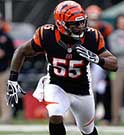|

 |
Tracking the
combine
bengals.com
The NFL Scouting Combine has come to this when it gets underway
Wednesday as the college prospects begin reporting to Indianapolis.
It makes Clif Marshall, director of Cincinnati's Ignition Sports and
that new breed of coach known as "NFL Combine Trainer" wake up the
echoes of his central Kentucky roots.
"I will feel like Bob Baffert at the Kentucky Derby," Marshall says of
the fabled trainer. "They know who the trainer is now. That's who I
feel like when they start the workouts. It can be stressful, but that's
how it is now."
Marshall heads into his eighth combine as one of the more recognizable
Bafferts of Indy as his card of 16 prospects competes with the huge
gyms of API and IMG in this new era of scientific combine preparation
that turns football into track for one week of the year.
He has split his group of 32 and taken 16 combine prospects to
Ignition's facility in Naples, Fla., for the past six weeks while
partner Ted Borgerding has stayed in Cincinnati working with
non-combine invitees that are ticketed for an NFL team's local workout
day in April. Marshall thinks at least 10 of his guys are going to get
drafted, mainly between the third and seventh rounds.
"It's just the scope of our business and the way it's changed,"
Marshall says. "It's gotten to the point where I'm now going into homes
to recruit. The players now, more than the agents, are deciding where
they want to train and you have to sell your facility. The day the
combine ends, I'm back on the road recruiting."
Marshall steered University of Cincinnati tight end Connor Barwin into
the top 50 of the 2009 draft as a defensive end with a monster combine,
and Rutgers cornerback Devin McCourty showed he could run fast enough
in 2010 to go late in the first round. Marshall has also had several
players run the fastest 40-yard dash in their position groups that
aided their draft status. Abilene Christian wide receiver Clyde Gates
was billed as the fastest offensive player at the 2011 combine with a
4.31 40. University of Cincinnati offensive lineman Jason Kelce led all
offensive linemen at least year's combine in the pro agility drill.
But as one of those rare trainers that has seen the combine from all
sides as a college coach at Louisville, an NFL assistant with the
Bengals, and now running his own gym, Marshall still calls himself "a
football guy," and offers reason among the track work of 40s, vertical
jumps and shuttle runs.
KEY INGREDIENTS
But if the combine is not everything, it's more than something. The
combine is the one place where the scouts can compare how players on
the draft board go head-to-head and can gauge who's actually faster and
stronger. And the watch matters.
"The 40-yard dash may be an arbitrary distance, but we've been doing it
for so long that there's now a huge database from which you can draw
certain conclusions about lack of speed," says one AFC scout. "There
are very few corners and receivers that survive in the NFL that run
4.7, 4.65 because there are so many other guys that are fast enough to
shut them down. Sometimes a slower corner in college, because of the
unlimited bump rule, can control a receiver down the field with his
hands and strength, and his lack of speed gets exposed in the NFL when
he has to take the hands off at five yards.
For the rest of this article and more, click here
|
|
|
|

